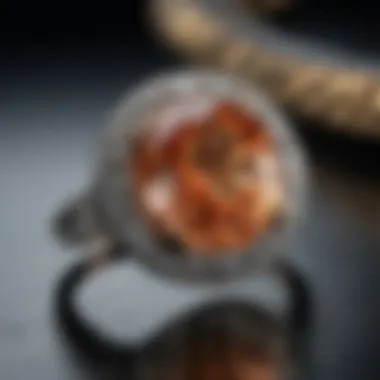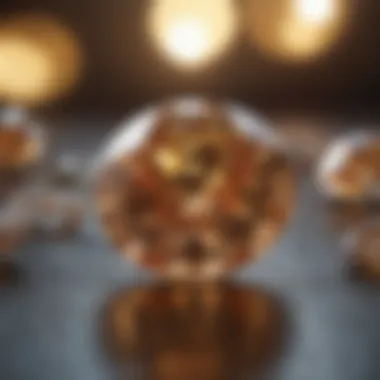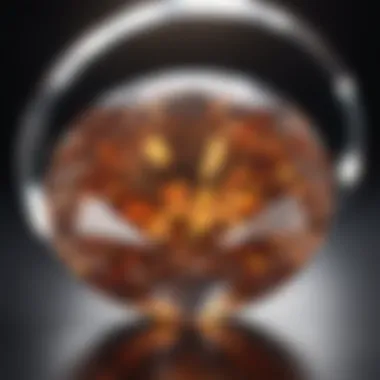Top Diamond Jewelers in the USA: A Comprehensive Guide


Intro
When searching for the perfect diamond, the jeweler plays a critical role in ensuring quality, ethics, and style. This article explores the landscape of diamond jewelers in the USA. We will examine their craftsmanship, ethical sourcing practices, and the unique offerings they provide. Understanding these facets is vital for consumers, as it affects not only their purchasing decision but also the broader impact of their choices on the jewelry market and environment. The jewelers highlighted here exemplify excellence in their fields, combining artistry with integrity.
The selection of a reputable jeweler is paramount. A good jeweler should be well-versed in the intricacies of diamonds, offering guidance throughout the buying process. Moreover, quality certification is essential. Real knowledge about diamonds can lead to better investment decisions.
As we delve deeper, we will analyze different aspects that differentiate the best jewelers. This includes current trends influencing the diamond market, from lab-grown diamonds to increased demand for ethically sourced gemstones. Readers will gain a well-rounded perspective of the industry's present and future as we morph through today's leading jewelers.
Preamble to Diamond Jewelers
In the realm of luxury and elegance, diamond jewelers hold a pivotal role. They do not merely sell jewelry; they offer an invitation into a world of craftsmanship, artistry, and often, deep emotional significance. Understanding this industry is crucial for anyone interested in purchasing fine jewelry. This section serves as an introduction to the multifaceted world of diamond jewelers and aims to illuminate what sets apart the best in the field.
Understanding the Diamond Market
The diamond market is a vibrant yet complex ecosystem that has evolved significantly over the years. The prices of diamonds fluctuate based on various factors including demand, quality, and sourcing practices. Market trends can influence what consumers seek as well as the pricing strategies of jewelers. Educated buyers need to consider the 4Cs: carat, cut, color, and clarity, as these characteristics determine not only the value but also the overall quality of a diamond.
Understanding this landscape can empower buyers to make informed choices when selecting their ideal pieces. Buyers might also explore new segments of the market, such as lab-grown diamonds, which present an ethical and often more affordable alternative.
Importance of Authenticity in Jewelry
Authenticity is at the heart of the jewelry industry. When purchasing a diamond, customers must ensure that what they are buying is genuine and ethically sourced. Certifications from recognized bodies such as the Gemological Institute of America (GIA) offer essential information regarding the authenticity and quality of diamonds. Without such verification, buyers risk investing in inferior or conflict-sourced gems,
"A true investment in jewelry is often linked to its provenance; knowing the source enhances both its value and meaning."
For buyers, the importance of authenticity cannot be overstated. It ensures not only the quality of the piece but also safeguards them from unethical practices often present in the wider industry. In summary, understanding the diamond market and ensuring authenticity are foundational to making informed, ethical, and satisfying jewelry purchases.
Factors to Consider When Choosing a Jeweler
Choosing a reputable jeweler is a pivotal decision for anyone looking to invest in diamond jewelry. A jeweler does not just sell diamonds; they shape an experience, your purchase, and later your memories associated with that piece. To navigate this landscape, several key factors can help you identify a jeweler’s quality and trustworthiness.
Quality of Craftsmanship
Craftsmanship is at the heart of any jewelry purchase. It is essential that the piece you choose is made with precision and attention to detail. High-quality craftsmanship is evident in the cut, setting, and overall presentation of the diamond. When evaluating the jeweler, consider the materials they use alongside their skill in jewelry making. A well-crafted piece not only looks stunning but can also hold its value over time. Look for jewelers who offer a warranty or guarantee, which can indicate confidence in their work. The visible and tactile aspects of a jewel can speak volumes about the jeweler's dedication to their craft.
Certifications and Credentials
Certifications provide a framework to assess the quality and authenticity of diamonds. Reputable jewelers often collaborate with established grading laboratories like the Gemological Institute of America (GIA) or the International Gemological Institute (IGI). These organizations provide grading reports that detail the quality of the diamond based on the four Cs: cut, clarity, color, and carat weight. Having access to certificates ensures you make informed decisions. Furthermore, it’s wise to ensure that the jeweler holds relevant credentials and memberships that reflect their commitment to ethical practices and ongoing education in the jewelry field.
Customer Reviews and Reputation
Reputation plays a crucial role in the selection process. Customer reviews can offer invaluable insights into the experiences others have had with a particular jeweler. Word-of-mouth recommendations carry weight and can be influential in recognizing a jeweler's strengths or weaknesses. Online platforms for review, including sites like Reddit, can provide candid feedback. When investigating the jeweler's reputation, look for consistency in quality, customer service, and after-sales support. A jeweler who prioritizes client satisfaction often extends beyond the sale, paving the way for lasting relationships with their customers.
"A trustworthy jeweler does not just sell products; they provide knowledge and support throughout your jewelry journey."
By taking the time to carefully consider these factors, consumers can better navigate the complex world of diamond jewelry. Each point addresses an aspect of a jeweler's value proposition and can guide your choice in selecting a source for exquisite diamond jewelry.


Ethical Sourcing in the Diamond Industry
Ethical sourcing in the diamond industry has become a pivotal aspect of jewelry purchasing. This growing emphasis stems from increasing awareness among consumers about the social and environmental implications tied to diamond mining. As people are more educated regarding the impact of their purchases, they prefer jewelers who prioritize ethical practices. This section will explore various elements that define ethical sourcing, its benefits to society and the environment, and its significance in a reputable jewelry business.
Understanding Conflict-Free Diamonds
Conflict-free diamonds refer to those stones that are sourced from areas where their sale does not fund armed conflict. The term gained attention particularly when it was found that diamonds from war zones were financing violence and suffering. The Kimberley Process was established in 2003 to prevent such occurrences. Jewelers who adhere to this protocol ensure that their diamonds are obtained legally and ethically.
Moreover, many jewelers employ stringent sourcing practices. They often provide transparency by sharing the journey of their diamonds, from mine to market. This often includes providing certification that verifies a diamond's origin. It is vital to ensure that the purchases being made facilitate positive impacts rather than perpetuate suffering.
Sustainability Practices Among Jewelers
Sustainability in the diamond industry goes beyond just sourcing. It encompasses a broader commitment to minimize environmental harm and promote social responsibility. Jewelers are increasingly adopting sustainable mining practices, which aim to reduce the carbon footprint associated with extraction and processing.
Another critical aspect of sustainability is the support for communities involved in diamond mining. Many leading jewelers contribute to local development, ensuring that communities benefit from the industry through education, health, and employment opportunities.
In addition, innovative practices like using renewable energy in mining processes or engaging in rehabilitation of mining sites exemplify a shift towards eco-friendly approaches.
Jewelry purchases, when supported by ethical and sustainable practices, can contribute to a better world.
The focus on ethical sourcing not only attracts conscientious consumers but also fosters trust in the brand. Ultimately, ethical sourcing is not just a trend; it is becoming a standard expectation that shapes the diamond market's future.
Overview of Leading Jewelers in the USA
Leading jewelers in the United States represent the pinnacle of craftsmanship in the diamond industry. This overview serves to highlight the unique attributes of prominent jewelers. Each jeweler brings distinct offerings, philosophies, and practices that cater to a variety of customer preferences. Understanding their strengths allows clients to make informed choices when purchasing diamonds.
High-quality diamonds do not only represent beauty; they also signify a substantial investment. Selecting a reputable jeweler becomes essential as this choice impacts both the product’s value and the buying experience.
Tiffany & Co., Brilliant Earth, Blue Nile, Harry Winston, and James Allen are among the leaders in the market. Their legacy, ethics, and innovation play a significant role in shaping consumer perceptions. Here are key elements to consider:
- Company History: The heritage and legacy of a jeweler often define its brand and customer trust.
- Shop Offerings: Signature pieces and exclusive designs are crucial for collectors and engaged couples alike.
- Service Quality: Excellent customer service enhances the shopping experience, ensuring satisfaction.
The following sections provide a closer look at each jeweler.
Tiffany & Co.
Company History
Tiffany & Co. was founded in 1837 by Charles Lewis Tiffany. From the beginning, it established reputation through exceptional quality and innovative designs. This long-standing history provides a sense of trust. Customers recognize the name as synonymous with luxury and elegance.
Signature Offerings
The jeweler is known for its iconic engagement rings and exquisite settings. The "Tiffany Setting" is one example of its signature designs. This specific feature elevates the diamond, enhancing its brilliance. Customers choose Tiffany not just for the diamond, but for the experience and allure associated with the brand.
Customer Service Excellence


Tiffany prides itself on an unparalleled buying experience. Clients experience attentive service, both online and in-store. The jeweler also offers extensive aftercare services, establishing long-term relationships with customers.
Brilliant Earth
Ethical Values
Brilliant Earth distinguishes itself with its commitment to sourcing conflict-free diamonds. This value-centric approach resonates with socially conscious consumers, making it a popular choice for ethical customers.
Unique Designs
The brand emphasizes custom designs. Brilliant Earth allows individuals to create personalized pieces, thus enhancing the emotional connection to the jewelry. The diverse catalogue supports various aesthetics, making it appealing to a broad audience.
Transparency in Sourcing
Transparency in sourcing contributes to customer trust. Brilliant Earth provides clear information about its diamonds, portraying an honest relationship with consumers. This aspect reassures customers about their choices, affecting their purchasing decisions.
Blue Nile
Online Retail Advantages
Blue Nile revolutionized the diamond purchasing process with its online platform. Customers can browse a vast collection from the comfort of their homes. This accessibility has made it easier for someone looking for the perfect piece.
Customization Options
Blue Nile offers numerous customization options. Customers can select diamond shapes, settings, and metals, creating unique pieces tailored to individual preferences. This flexibility enhances customer satisfaction.
Competitive Pricing
The online model allows Blue Nile to maintain competitive pricing. Without the overhead costs of a physical store, the jeweler can offer attractive prices. This aspect is particularly appealing for budget-conscious buyers seeking high-quality diamonds.
Harry Winston
Luxury Branding
Harry Winston is an epitome of luxury jewelry. Known as the "King of Diamonds," its branding focuses on exclusivity and prestige, attracting high-end clientele. This established opulence often translates into higher demand for its creations.
Exclusive Collections
The brand routinely releases limited edition collections. This exclusivity increases desirability among collectors and affluent buyers. Being part of this elite group adds to the allure of owning a Harry Winston piece.
High-Profile Clientele
Harry Winston’s connection with celebrities and high-profile individuals enhances its prestige. When a piece is worn on the red carpet, it becomes a subject of public admiration, which translates to increased brand value.
James Allen


Visual Technology
James Allen is recognized for its cutting-edge online presentation of diamonds. Customers can examine each diamond closely using 360-degree views. This technology demystifies the buying process, allowing for thorough assessment before purchase.
Education Resources
The jeweler also places a strong emphasis on education. Informational resources empower customers to make better choices, enhancing their buying confidence. This aspect supports knowledgeable consumers in a market often filled with confusion.
User Experience
The website is designed to provide an optimal user experience. Navigating the site is intuitive, making the diamond search straightforward. Customers appreciate the ease of purchasing, which may encourage return visits.
Emerging Trends in the Diamond Market
In the ever-evolving landscape of the diamond industry, it is essential to recognize emerging trends that shape consumer preferences and industry practices. Understanding these trends equips buyers and jewelry enthusiasts with insights into what to expect from diamond jewelers moving forward. As ethical considerations gain prominence, along with advancements in technology, the diamond market now embraces more innovative and personalized approaches. The trends discussed here not only reflect current consumer demands but also indicate a broader shift towards sustainability and authenticity in diamond jewelry.
Lab-Grown Diamonds
Lab-grown diamonds have rapidly transformed the jewelry market by offering a synthetic alternative to naturally mined diamonds. These diamonds are chemically and physically identical to their natural counterparts, but their production involves fewer environmental and ethical concerns. The growth process in a controlled environment results in a stone that is virtually indistinguishable from a natural diamond.
This offers several benefits:
- Affordability: Lab-grown diamonds generally cost 20-40% less than mined diamonds, making them accessible to a broader audience.
- Sustainability: The production of lab-grown diamonds minimizes negative environmental impacts often associated with mining.
- Ethical Sourcing: Without the risk of financing conflict, lab-grown diamonds provide peace of mind to consumers concerned about ethical practices in the diamond industry.
Moreover, the increasing acceptance of lab-grown diamonds reflects a shift in consumer attitudes, particularly among younger generations who prioritize sustainability.
Personalized Jewelry Experiences
Another significant trend is the demand for personalized jewelry experiences. Consumers are increasingly seeking unique and customized pieces that reflect their individuality. Jewelers are responding to this desire by incorporating advanced technology and design strategies. Key aspects include:
- Customization Options: Many jewelers now offer clients the chance to create bespoke pieces or modify existing designs, resulting in a one-of-a-kind end product.
- Interactive Platforms: Online retailers are enhancing user experiences through virtual try-ons and visualization tools that allow buyers to visualize how a piece will look before purchase.
- Experience over Product: Jewelry brands are increasingly focusing on providing memorable experiences, such as custom design consultations and storytelling around each piece's creation.
In summary, emerging trends like lab-grown diamonds and personalized experiences reflect a notable evolution in consumer preferences. These trends not only benefit consumers financially and ethically but also highlight the fusion of technology and artistry in modern jewelry. As these shifts continue to unfold, both buyers and jewelers alike must adapt to the changing landscape of the diamond market.
Closure: Choosing the Right Jeweler
Selecting a diamond jeweler is a crucial decision that has long-term implications for both emotional and financial investments. A jeweler’s reputation reflects on the quality and authenticity of the diamonds they sell. It is necessary to evaluate both the jeweler’s craftsmanship and their ethical sourcing practices. Understanding the characteristics that make a jeweler reputable can guide customers toward making informed choices right for them.
Choosing the right jeweler also means considering how their values align with one's own. This factor can lead to a more satisfying purchase experience. Jewelry is often a symbol of significant life moments, so selecting a jeweler who upholds high standards is essential. Knowing what to look for can help buyers avoid the pitfalls often associated with diamond purchases. The market is filled with options, but not all jewelers will meet the rigorous standards of quality and integrity.
Recap of Key Considerations
- Quality of Craftsmanship: Look for jewelers who demonstrate exceptional skills in design and creation.
- Certifications and Credentials: Ensure the jeweler provides certification for their diamonds, reflecting their authenticity and value.
- Customer Reviews and Reputation: Research online reviews and testimonials to understand how past customers feel about their purchases.
- Ethical Sourcing: Support jewelers committed to environmentally and socially responsible practices.
- Personalized Service: Consider those who offer tailored experiences reflecting personal preferences.
All these elements create a foundation for informed decision-making, ensuring that your investment is not only wise but meaningful.
Final Thoughts on Investment in Jewelry
Investing in jewelry goes beyond monetary considerations. It encompasses emotional value, aesthetic appreciation, and cultural significance. The right piece can represent milestones, celebrations, or personal achievements. When contemplating an investment, it’s essential to think about both present enjoyment and future value. While trends may rise and fall, certain pieces maintain timeless appeal.
A diamond will typically hold its value if sourced from reputable jewelers and backed by clear provenance.
In the end, choosing a jeweler is not just about a purchase; it is about establishing trust and creating lasting memories. Therefore, ensure careful consideration of all details, from quality and ethics to service and reliability. Jewelry should resonate with your values and aspirations.



